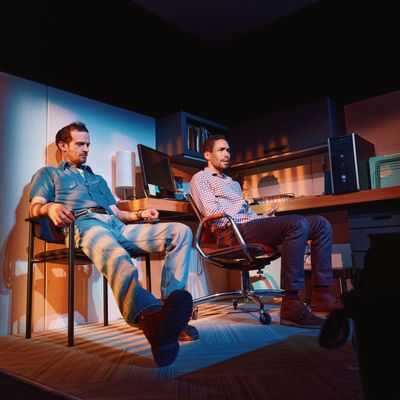
Outside the theater for A Case for the Existence of God, the latest crystalline play by Samuel D. Hunter, there’s a map. It is, of course, a map of Idaho. The playwright has spent more than a decade writing about life there, setting his poignant, searching dramas in a breakroom in Bright New Boise, in the backyards and big-box stores of Lewiston/Clarkston, in the mines under Greater Clements. The lobby display — which shows you where all the other plays take place — was put together by the show’s dramaturg (and Hunter’s husband), John Baker. On stage, we get the writer’s midwestern miniature; in the foyer, his husband’s wide-horizon portrait.
Because it’s Idaho, because it’s America, because it’s roughly now — the state of things is normalized precarity. Buttoned-up Keith (Kyle Beltran) is a mortgage broker in Twin Falls; discombobulated Ryan (Will Brill) wants to buy some property lost a generation ago by a careless ancestor. There’s a procedure for getting a loan, so their initial conversations are, depending on your immunity to home-ownership nerves, mild. Keith patiently explains debt-to-income-ratio problems to Ryan, or Ryan vents about his divorce and custody arrangements. Keith tries to guide him back to questions of APR and adjustable rates, and — eventually, after Ryan seems unwilling to grasp the basics — Keith politely explodes:
Look, you’re not the first person to realize that the financial system is convoluted. Most of us realize that in college. But you either play by the rules and pretend it all means something, or you don’t get anything. That’s most of what being an adult is. And you just hope that everyone else agrees to keep playing by the rules long enough so you have time to grow old and die.
Keith is sympathetic, though; he’s caught up in his own convoluted, extractive, hope-based system — converting his current foster-parenting situation to an adoption. The two men connect first through their infant daughters, then through what Ryan notes is their shared “sadness,” which leads to deepening gestures of friendship and contact. Each is trying to build a foundation, whether by constructing a house or claiming a child, but uncaring systems keep reducing their concrete plans to sand.
As a daring bit of self-restriction, Hunter keeps his two characters nearly motionless for almost the entire one-act play. In David Cromer’s exquisitely judged, perfectly performed production at the Signature Theater, the two men stay seated in Keith’s small cubicle office under a dropped, fluorescent ceiling, the cramped space (filing drawers, monitors, cabinets) suspended like a vivid droplet against designer Arnulfo Maldonado’s white cyclorama. Time hops forward, the men meet week after week, but you can only tell because a computer’s screensaver shifts; Hunter’s scenes bleed into each other, and in the cubicle, the shadows barely change.
The playwright has reduced his components to the bare minimum, offering us Hunter superfans a chance to marvel at his elegant way with exposition and the stealthy way he lures us down into the deep end of the emotional pool. He keeps warning us that he’s going to do it: He has Keith teach Ryan the word “harrowing,” and you dutifully make a note — but then the pain comes as a surprise anyway. Hunter’s title might make you wonder when God is going to show up, but even without any overt mention of religion in the text, it touches and adjusts our interpretation of events. Should we think about the ways in which a mortgage broker is a kind of intercessor? Or that “harrowing” can also refer to liberating souls from Hell?
With our curiosity (and metaphor-brain) piqued by the title, we can follow Hunter as he looks deeper into his characters than the usual drama would — past behavior, past childhood, past successes and failures. He winds up considering the passage of time itself. (We should have known from that first chronological slipper-slide that Hunter was thinking about it.) The important thing is that the men spend time together, any kind of time, even if it doesn’t always seem as though it’s serving a purpose. “Keep playing by the rules long enough,” said Keith, and the play — in a beautiful and mysterious turn — changes our ideas on the subject of what “long enough” really is. At one point, Keith, a student of early music, tries to explain polyphony to Ryan, and he even plays a bit to demonstrate the beauty of two intertwined male voices. Ryan, drunk, sleeps through it, but we’re leaning forward. We know exactly what Hunter is doing. He’s demonstrating how he gets his sacred effects, one melodic line at a time.
A Case for the Existence of God is at the Signature Theatre through May 22.





